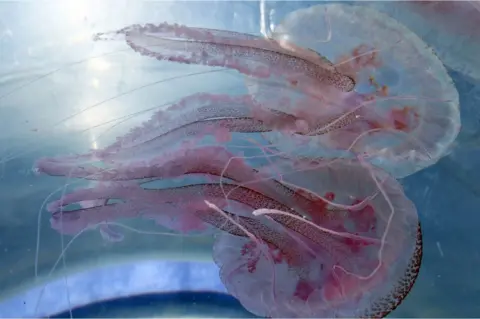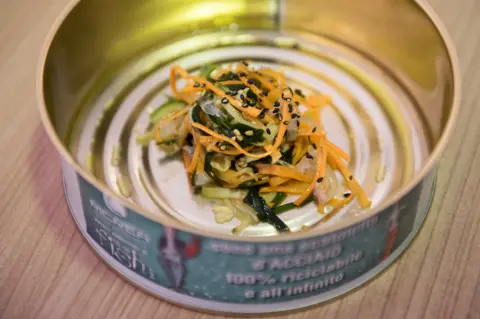Invasion of the jellyfish: Is it time to get frying?
 Getty Images
Getty ImagesJellyfish numbers have been increasing rapidly in the Mediterranean and one species that has long been a hazard for bathers there - the mauve stinger - is increasingly being seen around the British Isles. Now one marine biologist says if we can't beat them we should eat them.
I'm hovering in a makeshift kitchen, watching one of Italy's most eminent marine biologists gleefully playing chef. Prof Silvio Greco is focused on the bubbling contents of a large pot.
Dressed up for the part in chef's whites, traditional hat and red apron, the sustainable conservation expert is perfect for the role.
"In this water I have put lemon juice and vinegar. After boiling for a few minutes I will plunge it into this ice," he gestures, explaining how the hot water both sterilises, getting rid of bacteria, and destroys the stinging poison.
What for some might be food hell has got my tastebuds jumping with curious excitement: we're about to eat jellyfish. For Greco, it's not the first time.
"I love seafood," he beams. "Jellyfish remind me of oysters. When you eat them you experience an explosion of the sea on your tongue. They are, after all, 90% seawater."
 Alessandro Vargiu / Archivio Slow Food
Alessandro Vargiu / Archivio Slow FoodToday he's enlisted the professional help of restaurant chef Marco Visciola, who confesses he's never cooked jellyfish before. He's going to fry it in a tempura batter made of potato, wheat and rice flours, mixed with sparkling water. "No salt?" I ask. "Zero," he tells me. "The jellyfish already has the salty flavour of the sea, so to bring out its flavour I've left the batter neutral."
This isn't some perverse chef's challenge, but part of a campaign that Greco is promoting at the Slow Fish festival. Held every two years at Genoa's porto antico the event encourages sustainable fishing and responsible consumption. There are at least four times as many jellyfish in the Mediterranean now as there were in 2004, with global climate change, pollution, and overfishing mostly to blame. And the message this cooking demo is sending out is: if you can't defeat them, eat them.
"The sea is full of them and it's a big problem for biodiversity," says Silvio Greco, describing jellyfish as rampant, opportunistic species that immediately take over any empty space in the water. He explains how their spread is devastating marine food chains and ecosystems, and how illegal fishing of natural jellyfish predators like tuna and turtles has left the coast clear for them to multiply. "Now man," he concludes, "must be the new predator of jellyfish."
It's an idea the UN's Food and Agriculture Organization is encouraging too. For years, fishermen have been finding their nets increasingly burdened with unwanted jellyfish that they simply throw back into the sea. Silvio Greco hopes this will change and says that sustainability aside, jellyfish is actually good for you: rich in protein and collagen, low in calories, and fat-free.
 Alessandro Vargiu / Archivio Slow Food
Alessandro Vargiu / Archivio Slow FoodAt Slow Fish I discover the "eat it to beat it" approach isn't limited to the Mediterranean. There's a Caribbean delegation of fishers, researchers and marine biologists here to pool ideas on how to fight their worst invasive species: the lionfish. They are trying to get it on to menus from Mexico to Honduras, Costa Rica to Barbados. Its tender meat, which apparently tastes like snapper, certainly sounds more appetising than jellyfish.
But the jellyfish cooking demo is, without a doubt, the biggest crowd-puller of the entire festival. As the tray of fresh medusa fritta is passed around, eager fingers grab the piping hot morsels. I select my piece. The tempura is exquisite, cracking seductively between my teeth. I'd expected the jellyfish to be chewy like calamari, but it's squidgier. It might just be because I'm hungry but I really like it.

Find out more
- From Our Own Correspondent has insight and analysis from BBC journalists, correspondents and writers from around the world
- Listen on iPlayer, get the podcast or listen on the BBC World Service or on Radio 4 on Saturdays at 11:30 BST

A young woman exclaims it's "surprisingly nice" while a Taiwanese lady tells me jellyfish is a common antipasto back home and she was curious to see what the Italians would do with it. The man beside me is unimpressed. "The batter's nice but the jellyfish tastes of nothing and it's slippery," he grumbles. I ask a three-year-old what she thinks. "Yummy or yucky?" "Yummy!" she grins at me, chewing happily. She was probably hungry too.
 Alessandro Vargiu / Archivio Slow Food
Alessandro Vargiu / Archivio Slow FoodMarco Visciola has also made a boiled jellyfish salad with rice vinegar, sesame oil, carrot and cucumber - a traditional recipe a Japanese colleague gave him. Again I'm impressed, although I think jellyfish's neutral taste - or lack of taste - could lend itself to any decisive flavours.
 Alessandro Vargiu / Archivio Slow Food
Alessandro Vargiu / Archivio Slow FoodBut Marco's sold. "For me, it was a new experience and there were a lot of curious people," he enthuses, adding that he now plans to put locally caught jellyfish on his restaurant's summer menu. "It's a novelty a chef can offers diners. I think it will become popular."
I'm not entirely convinced. But if you never want another seaside holiday to be ruined by a coastal jellyfish invasion, perhaps it really is time to stop fretting and start frying.
